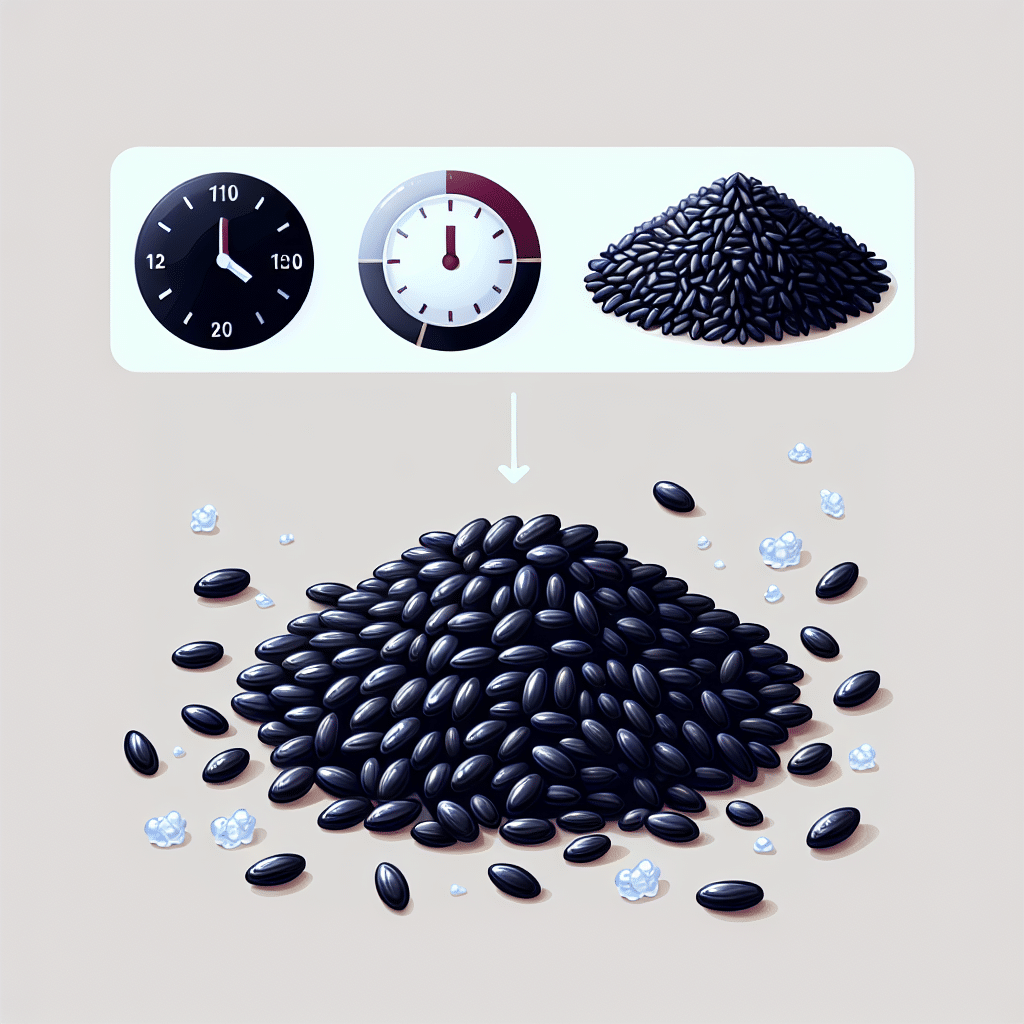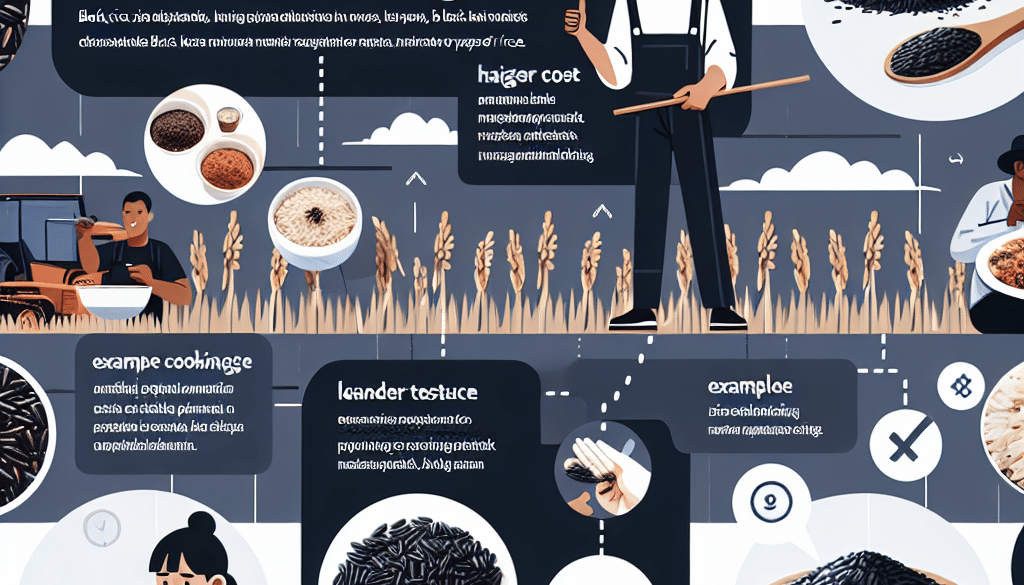What is the disadvantage of black rice?
-
Table of Contents
- Black Rice: Unveiling Its Disadvantages Despite Nutritional Benefits
- 1. Nutritional Profile and Health Benefits of Black Rice
- 2. Disadvantages of Black Rice
- Cost and Accessibility
- Longer Cooking Time
- Heavy Metal Accumulation
- Dietary Restrictions
- Gastrointestinal Discomfort
- Interference with Medication
- 3. Case Studies and Statistics
- 4. Conclusion: Balancing the Pros and Cons
- 5. Discover ETprotein’s High-Quality Protein Products
Black Rice: Unveiling Its Disadvantages Despite Nutritional Benefits

Black rice, often referred to as ‘forbidden rice’ due to its historical significance, is a type of whole grain rice that is renowned for its high nutritional value. It is rich in antioxidants, fiber, and contains more protein than brown rice. Despite its numerous health benefits, black rice also comes with certain disadvantages that consumers should be aware of. This article delves into the less-discussed downsides of black rice, providing a comprehensive understanding of this ancient grain.
1. Nutritional Profile and Health Benefits of Black Rice
Before we explore the disadvantages, it’s important to acknowledge the impressive nutritional profile of black rice. It is a rich source of anthocyanins, the pigments that give it its distinctive color and are known for their potent antioxidant properties. Black rice is also a good source of iron, vitamin E, and fiber. These nutrients contribute to various health benefits, such as improved heart health, reduced inflammation, and better digestive health.
2. Disadvantages of Black Rice
Despite its health benefits, black rice has several disadvantages that may affect its suitability for some consumers. Here are the main concerns associated with black rice:
Cost and Accessibility
One of the primary disadvantages of black rice is its cost. It is typically more expensive than white or brown rice due to lower yield rates and the cost of cultivation. Additionally, black rice is not as widely available as other rice varieties, which can make it harder to find and purchase, especially in certain regions.
Longer Cooking Time
Black rice requires a longer cooking time compared to white rice. This can be inconvenient for individuals with busy lifestyles or those who do not have the time to spend cooking complex meals. The need for extended cooking can also lead to higher energy consumption, which may be a concern for environmentally conscious consumers.
Heavy Metal Accumulation
Like other rice varieties, black rice can accumulate heavy metals such as arsenic from the soil and water it is grown in. Consuming rice with high levels of arsenic over time can pose health risks. While this is not unique to black rice, its health-conscious consumer base may be particularly concerned about this issue.
Dietary Restrictions
For individuals with certain dietary restrictions, such as those on low-carbohydrate or ketogenic diets, black rice may not be suitable due to its high carbohydrate content. Although it is a whole grain and a healthier option than refined grains, it still may not fit into all dietary plans.
Gastrointestinal Discomfort
Black rice is high in fiber, which is beneficial for digestive health. However, for some individuals, particularly those not accustomed to high-fiber diets, consuming black rice may lead to gastrointestinal discomfort, bloating, and gas.
Interference with Medication
The high antioxidant content in black rice, while generally beneficial, can interfere with certain medications. For example, the high vitamin K content can affect blood-thinning medications. It is important for individuals on medication to consult with their healthcare provider before incorporating black rice into their diet.
3. Case Studies and Statistics
While there are no specific case studies focusing solely on the disadvantages of black rice, numerous studies have highlighted the potential risks associated with heavy metal content in rice. For instance, a study published in the “Environmental Science & Technology” journal found that rice can contain significant levels of arsenic, which varies depending on the geographical location and cultivation practices.
Statistics from the Food and Agriculture Organization (FAO) indicate that the production of black rice is significantly lower than that of white or brown rice, which contributes to its higher cost and reduced availability.
4. Conclusion: Balancing the Pros and Cons
In conclusion, while black rice offers a range of health benefits due to its rich nutritional content, there are several disadvantages to consider. These include its higher cost, longer cooking time, potential for heavy metal accumulation, unsuitability for certain diets, possible gastrointestinal discomfort, and potential interference with medications. Consumers should weigh these factors against the health benefits when deciding whether to include black rice in their diet.
5. Discover ETprotein’s High-Quality Protein Products
If you’re looking for alternative sources of nutrition that complement your dietary needs, consider exploring ETprotein’s range of protein products. ETprotein offers a variety of organic and high-quality protein powders, including rice protein, which can be a great addition to your diet without the disadvantages associated with black rice.
ETprotein’s products are characterized by their neutral taste, non-GMO, and allergen-free attributes, making them suitable for a wide range of dietary preferences. With L-(+)-Ergothioneine purity over 98%, ETprotein’s offerings cater to industries such as nutraceuticals, pharmaceuticals, cosmeceuticals, and food and beverage, ensuring that you have access to the best protein sources available.
For those interested in incorporating high-quality protein into their diet, ETprotein’s rice protein and other plant-based proteins are excellent choices. To learn more about their products and how they can benefit your health, contact ETprotein and email sales(at)ETprotein.com today.
About ETprotein:
ETprotein, a reputable protein and L-(+)-Ergothioneine (EGT) Chinese factory manufacturer and supplier, is renowned for producing, stocking, exporting, and delivering the highest quality organic bulk vegan proteins and L-(+)-Ergothioneine. They include Organic rice protein, clear rice protein, pea protein, clear pea protein, watermelon seed protein, pumpkin seed protein, sunflower seed protein, mung bean protein, peanut protein, and L-(+)-Ergothioneine EGT Pharmaceutical grade, L-(+)-Ergothioneine EGT food grade, L-(+)-Ergothioneine EGT cosmetic grade, L-(+)-Ergothioneine EGT reference grade and L-(+)-Ergothioneine EGT standard. Their offerings, characterized by a neutral taste, non-GMO, allergen-free attributes, with L-(+)-Ergothioneine purity over 98%, 99%, cater to a diverse range of industries. They serve nutraceutical, pharmaceutical, cosmeceutical, veterinary, as well as food and beverage finished product distributors, traders, and manufacturers across Europe, USA, Canada, Australia, Thailand, Japan, Korea, Brazil, and Chile, among others.
ETprotein specialization includes exporting and delivering tailor-made protein powder and finished nutritional supplements. Their extensive product range covers sectors like Food and Beverage, Sports Nutrition, Weight Management, Dietary Supplements, Health and Wellness Products, and Infant Formula, ensuring comprehensive solutions to meet all your protein needs.
As a trusted company by leading global food and beverage brands and Fortune 500 companies, ETprotein reinforces China’s reputation in the global arena. For more information or to sample their products, please contact them and email sales(at)ETprotein.com today.












